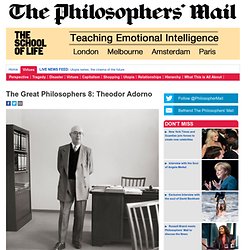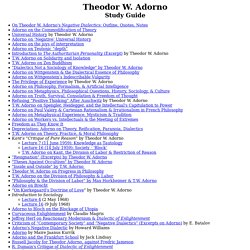

Slavoj Zizek. The Great Philosophers 8: Theodor Adorno. © Getty Theodor Wiesengrund Adorno was born in Frankfurt in 1903 into a wealthy and cultured family.

His father, a wine merchant, was of Jewish origin but had converted to Protestantism at university. Teddy (as his closest friends called him) was an extremely fine pianist from a young age. Until his twenties, he planned for a career as a composer, but eventually focused on philosophy. In 1934, he was barred, on racial grounds, from teaching in Germany. Adorno believed that intellectuals should band together to change society, and he was closely connected with the pioneering Institute of Social Research, which had been founded and funded by his friend Felix Weil (whose father was a hugely successful commodities trader).
Adorno drew attention to three significant ways in which capitalism corrupts and degrades us: 1. Adorno had a highly ambitious view of what leisure time should be for. . © Time & Life Pictures/Getty 2. 3. . © UIG/Getty Conclusion. Study Guides: Theodor W. Adorno & Critical Theory. Theodor W.

AdornoStudy Guide Other Critical Theorists & Related Persons Offsite Links (English-Language Sources) on Adorno Offsite Essays & Other Texts Offsite Video & Audio Offsite Links on Critical Theory Offsite Essays & Books on Critical Theory Home Page | Site Map | What's New | Coming Attractions | Book NewsBibliography | Mini-Bibliographies | Study Guides | Special Sections My Writings | Other Authors' Texts | Philosophical QuotationsBlogs | Images & Sounds | External Links CONTACTRalph Dumain. Communitarianism [SEP]
1.
![Communitarianism [SEP]](http://cdn.pearltrees.com/s/pic/th/communitarianism-encyclopedia-103117044)
Universalism Versus Particularism Communitarians have sought to deflate the universal pretensions of liberal theory. The main target has been Rawls description of the original position as an ‘Archimedean point’ from which the structure of a social system can be appraised, a position whose special virtue is that it allows us to regard the human condition ‘from the perspective of eternity’,[3] from all social and temporal points of view.
Whereas Rawls seemed to present his theory of justice as universally true, communitarians argued that the standards of justice must be found in forms of life and traditions of particular societies and hence can vary from context to context. Rawls has since tried to eliminate the universalist presuppositions from his theory. Other liberal theorists have taken a harder line against communitarian concessions, arguing that liberal theory can and should present itself as a universally valid ideal. Total Philosophy: Why should we be governed? - John Locke. Distributive justice [SEP] 1.
![Distributive justice [SEP]](http://cdn.pearltrees.com/s/pic/th/distributive-encyclopedia-10888946)
Scope and Role of Distributive Principles Distributive principles vary in numerous dimensions. They vary in what is considered relevant to distributive justice (income, wealth, opportunities, jobs, welfare, utility, etc.); in the nature of the recipients of the distribution (individual persons, groups of persons, reference classes, etc.); and on what basis the distribution should be made (equality, maximization, according to individual characteristics, according to free transactions, etc.). In this entry, the focus is on principles designed to cover the distribution of benefits and burdens of economic activity among individuals in a society. Although principles of this kind have been the dominant source of Anglo-American debate about distributive justice over the last five decades, there are other important distributive justice questions, some of which are covered by other entries in the encyclopedia. 2.
Money is an index for the value of material goods and services. Political Theologies: Past, Present, and Future (Keynote featuring Mark Lilla & John Milbank) Raymond Geuss - Philosophy and Real Politics. The Essential Marcuse. John Rawls [IEP] John Rawls was arguably the most important political philosopher of the twentieth century.
![John Rawls [IEP]](http://cdn.pearltrees.com/s/pic/th/encyclopedia-philosophy-19157222)
He wrote a series of highly influential articles in the 1950s and ’60s that helped refocus Anglo-American moral and political philosophy on substantive problems about what we ought to do. His first book, A Theory of Justice [TJ] (1971), revitalized the social-contract tradition, using it to articulate and defend a detailed vision of egalitarian liberalism. In Political Liberalism [PL] (1993), he recast the role of political philosophy, accommodating it to the effectively permanent “reasonable pluralism” of religious, philosophical, and other comprehensive doctrines or worldviews that characterize modern societies. He explains how philosophers can characterize public justification and the legitimate, democratic use of collective coercive power while accepting that pluralism.
Table of Contents 1. John Bordley Rawls was born and schooled in Baltimore, Maryland, USA. 2. A. B. C. I. Ii.